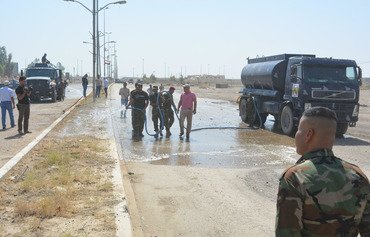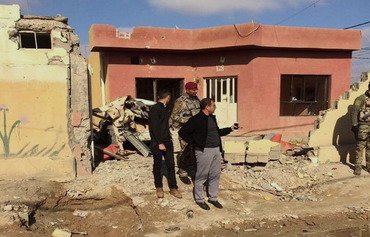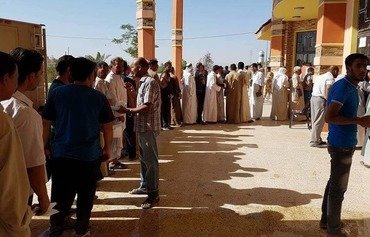Iraqi authorities are asking displaced families who seek to return to Fallujah to fill out a security form that will provide information for a background check, saying local officials plan to start receiving returnees next month.
The application can be accessed on this official website: www.alfalluja.net
"It includes personal details on the head of the family, his job, the family's original address of residence and its current place of displacement, in addition to a statement of whether any of its members is out of the country or if any of them was involved in belonging to terrorist organisations," said Anbar provincial council security committee member Aifan Barakat.
The form was developed in co-ordination with the prime minister's office to facilitate the application process for returnees, he told Diyaruna.
"There is a joint committee, formed by the mayor of Fallujah and the security and intelligence apparatuses, that took upon itself to check such requests and verify the security background of the family wishing to return," he said.
In mid-September, he said, families should be able to start returning to the city.
"This will be a gradual return, in the form of batches in frequent intervals," he said, adding that each batch of returnees will comprise at least 1,000 families.
Thousands of applications
"We have received about 10,000 applications this week," said deputy mayor of Fallujah Issa al-Sayer.
"It is likely that applications received from the displaced from the areas of al-Hasi and al-Nasaf, south-west of Fallujah, will be checked next month and then [we will] attempt to return them to their former areas," he said.
The local administration is making every effort to restore basic services prior to initiating the return of the displaced population, he said, noting that the municipality has removed rubble, burnt-out cars and explosive material from the city's main streets.
"Al-Askari neighbourhood water project and the Old Fallujah water project, in addition to two other projects, were restored to operation in order to provide returning residents with drinking water," he added.
The Department of Electricity also began operating the power plant in Saqlawiyah area after installing two 63-megawatt capacity converters, he said.
Additionally, he said, maintenance work has been conducted at the city's sewage plants and on some of the infrastructure destroyed by the "Islamic State of Iraq and the Levant" (ISIL), including Fallujah's "New Bridge" in the city centre.
"Field surveys also have been prepared for the affected facilities in order to begin restoring them in the near term," he added.
"The security forces managed to dismantle thousands of improvised explosive devices (IEDs) and mines planted by ISIL," he said, adding that the city is mostly safe, with military engineering units working to clear explosives from some remaining roads.
Hope for speedy return
The Anbar provincial council is seeking to speed up the return of the displaced population to Fallujah, council member Farhan al-Obeidi told Diyaruna.
The required security form is "a necessary step to ensure that none of those involved with ISIL gangs or those whose hands are stained with the blood of innocent people return", he stressed.
"It is important to check the return requests with professionalism and high accuracy," he added.
Meanwhile, Fallujah reconstruction efforts are continuing in full swing, al-Obeidi said.
"Infrastructure in various service sectors will need a longer period of time and more material resources for rehabilitation," he said. "But local government departments in the city are currently working on restoring basic services to provide the foundations for stability and for starting a normal life for the returning residents."

![Burnt-out cars are removed from the streets of Fallujah as part of local government efforts to prepare the city for returnees. [Photo courtesy of Fallujah Mayoralty]](/cnmi_di/images/2016/08/18/6015-Iraq-fallujah-returnees-600_384.jpg)






